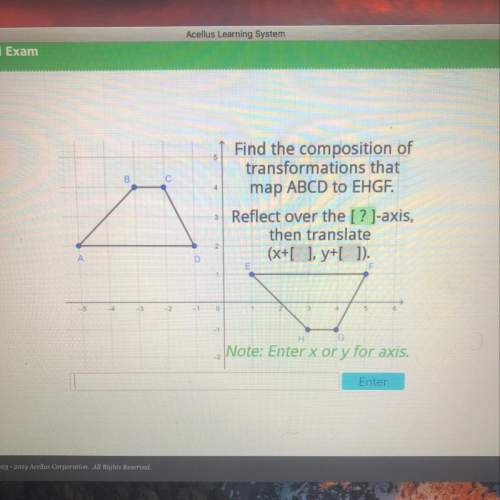For the following argument, which statement is a premise?
argument:
any three po...

Mathematics, 05.02.2020 12:01 StupidityIsKey
For the following argument, which statement is a premise?
argument:
any three points that are noncollinear define a plane.
points p, q, and r are noncollinear.
therefore, points p, q, and r define a plane.
any two points define a line.
points p, q, and r are noncollinear.
points p, q, and r define a plane.
every plane is flat. for the following argument, which statement is a premise?
argument:
any three points that are noncollinear define a plane.
points p, q, and r are noncollinear.
therefore, points p, q, and r define a plane.
any two points define a line.
points p, q, and r are noncollinear.
points p, q, and r define a plane.
every plane is flat.
question 2 which of the following conclusions completes the syllogism?
premise 1: if you bisect an angle, then the two resulting angles will be congruent.
premise 2: if the two resulting angles are congruent, then they will have equal
measure.
conclusion:
if the two angles have equal measure, then you bisected an angle.
if two angles are congruent, then an angle has been bisected.
if you bisect an angle, then the two resulting angles will have equal measure.
if you bisect an angle, then you will get two resulting angles.
question 3. which statement about the following argument is true?
argument:
if you do not get enough sleep, you will be tired.
you did not get enough sleep.
you will be tired.
the argument is valid by the law of syllogism.
the argument is valid by the law of detachment.
the argument is invalid.
the argument is valid, but does not follow the law of syllogism or the law of detachment.
question 4. which statement is true about the following argument?
argument:
if two lines are perpendicular, then they intersect to form right angles.
lines ab and cd intersect to form right angles.
therefore, lines ab and cd are perpendicular.
the conclusion is true, but the argument is not valid.
the conclusion is false, and the argument is not valid.
the conclusion is true, and the argument is valid by the law of syllogism.
the conclusion is true, and the argument is valid by the law of detachment.
question 5. which statement about the following argument is true?
argument:
if you have a job, then you have an income.
if you have an income, then you must pay taxes.
therefore, if you have a job, then you must pay taxes.
the argument is valid by the law of syllogism.
the argument is valid by the law of detachment.
the argument is invalid.
the argument is valid but does not follow the law of syllogism or the law of detachment.

Answers: 1


Other questions on the subject: Mathematics

Mathematics, 21.06.2019 15:00, jamiehorton2000
What is the value of the expression below? (81^2)^1/8
Answers: 1



Mathematics, 21.06.2019 19:30, BarcaOsama
Which of the following is the explicit rule for a geometric sequence defined a recursive formula of a -5a for which the first term is 23?
Answers: 1
You know the right answer?
Questions in other subjects:

Social Studies, 12.09.2019 04:20

Mathematics, 12.09.2019 04:20

History, 12.09.2019 04:20


History, 12.09.2019 04:20




Mathematics, 12.09.2019 04:20

English, 12.09.2019 04:20




